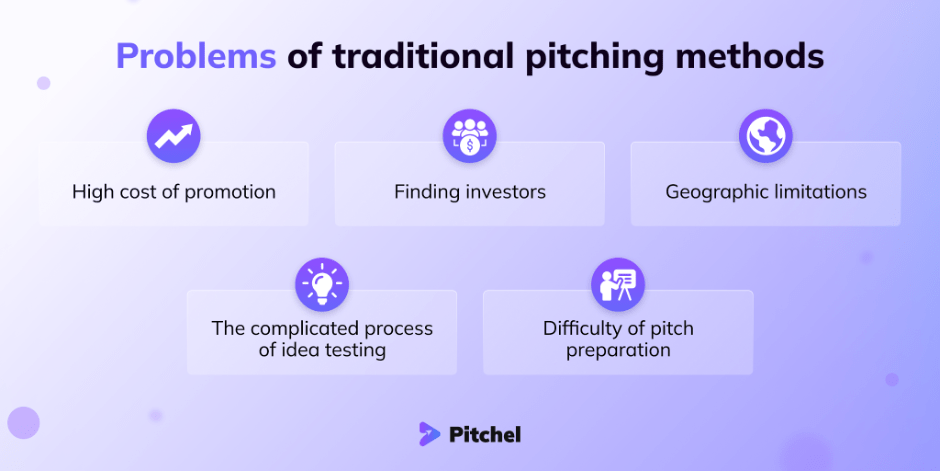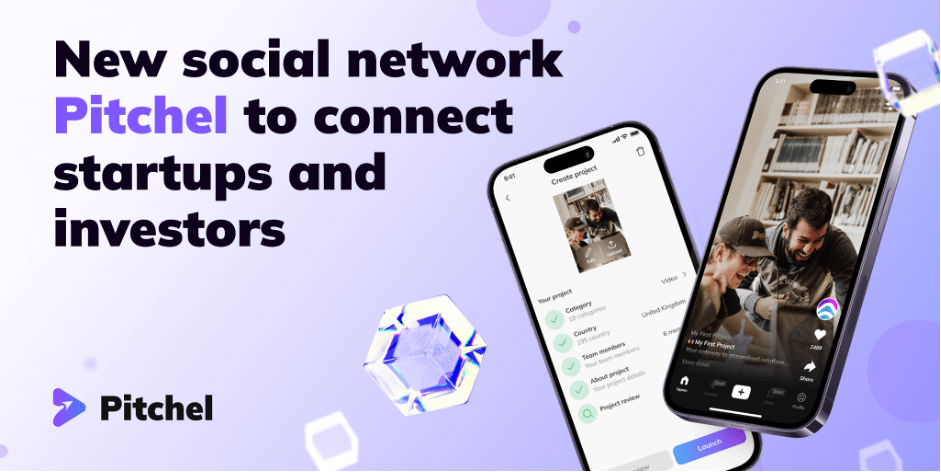Pitchel, the dynamic and innovative mobile app available on Google Play, is set to revolutionize the way startups connect with investors and unleash their potential. In a world driven by innovation and technology, Pitchel stands as the bridge that connects aspiring entrepreneurs with eager investors, and it’s here to make a profound impact.
In the modern, fast-paced world where most people have easy access to information on the Internet, it is difficult for innovators and developers to communicate the value of their ideas and stand out from the information noise. Traditional pitching methods are no longer as effective as they were, so startups face the challenge of attracting new investment.
According to CBInsights, the number one reason startups fail is running out of cash and failing to raise new capital, with 38% of projects facing it.
Startups have to find new pitching formats to attract the attention of consumers and investors, test ideas, and raise funds to realize them.
Problems of Traditional Pitching Methods
The pitching tool provides many opportunities for startups that are unable to develop due to a lack of funds. Pitching allows them not only to interest investors but also to analyze the market and their products, to take a fresh look at their businesses and prospects.
However, traditional pitching methods have a few problems that innovative idea owners and early-stage businesses can face.
#1. High cost of promotion.
Traditional marketing and pitching may cost more than the budget of a new project allows. According to the SBA research, 33% of startups are funded for less than $10,000. It’s a small amount to fast growth and scaling of the business.
#2. Finding investors.
This is a long and time-consuming process for the startup team. They need to find investors who are on the lookout for investment opportunities, arrange a pitching session, and prepare a presentation. This approach takes a lot of time and effort but does not guarantee a successful outcome. There are many risks, such as a different view of the business between the team and investors, a failed pitch, or a product that doesn’t catch their interest.
#3. Geographic limitations.
Finding investors is restricted to the physical location of the startup and its team. This limits the range of interested investors and opportunities for raising funds.
#4. The complicated process of idea testing.
According to the Forbes article, founders need 2 to 3x longer than they expect to validate a business model. Research and testing can be time-consuming and expensive, but it is required for the traditional pitching method. Experienced investors are more interested in the idea viability and business model of a project than in its uniqueness or progressiveness.
#5. Difficulty of pitch preparation.
There are many tips for startups on how to prepare a presentation and pitch it to investors. But any recommendation can’t guarantee that a startup will 100% succeed in getting investment. If the pitch is failed and investors are not interested, most likely the startup will not have a second chance to fix it. In such a case, the team will have to start the process of finding investors from scratch.
Social Media for Pitching and Marketing
According to the SEJ research, there are 4.8 billion social media users worldwide, representing 59.9% of the global population. The average time spent on social media daily is 2 hours and 24 minutes. Users not only get information and entertainment content through social networks, but they also shop, communicate, make important decisions, and so on.
Today, many companies have already adapted their marketing strategies to the active use of social media by consumers. They more effectively highlight their value, reach the right target audience, and try to stand out among competitors.
A social media promotion strategy can also work for startups that want to attract investment and test the market demand for their products.
The Pitchel mobile app is developed with all the benefits of pitching startups on social media to give projects and investors a platform for effective communication. It is a user-friendly social network that is designed for startups, investors, and users looking for inspiration and tracking trends across industries.
#1. Marketing for different budgets.
At the start of promoting a new business, a team may have a limited budget that falls into several categories: product development, idea testing, marketing, etc. Social media algorithms allow them to create marketing strategies with different levels of startup capital.
The social networking format of the Pitchel app allows startups to register an account for free and pitch their idea to a wide audience.
#2. Connecting startups with investors and focusing on the target audience.
Unlike traditional pitching methods, which can reach entirely different people, social media allows startups to present themselves to a more engaged audience.
Pitchel was created to connect startups looking for funding and investors ready to fund an interesting and promising project on one platform.
In the Pitchel app, investors can personalize their feeds by choosing a category and country, which allows startups to appear more pinpointed to interested users. It is easier for startups to present their idea, and for investors to quickly find among all the ideas the one that fits their needs.
#3. Investment opportunities without geographic limitations.
The big advantage of social networks is that they are available almost everywhere. This avoids attachment to the physical locations of the projects.
Every user can participate in investments and discover attractive projects without geographical boundaries and the difficulties of entering various industries through the Pitchel app. Each new project gets the opportunity to present its idea to potential investors from around the world to agree on further cooperation using only their smartphones.
#4. Recognize industry trends and test demand for the project.
Specific platforms and social networks help startups get feedback from investors and other users. Understanding the market demand for the product and the viability of the business model is very important for the realization of a startup.
At Pitchel, investors can evaluate startups, their pitches, and business models. If they like the project but think the idea needs to be refined, they can give feedback to the team to fix the flaws.
#5. Simple to share information.
Startups can conveniently report updates and talk about the benefits of their ideas and the problems they are solving. Traditional pitching methods require projects to seriously prepare and elaborate their business model creating lengthy presentations.
Social networks are characterized by a lighter format for presenting information, which will be easier for users to perceive. In Pitchel, teams can conveniently pitch their startups to potential investors through short video presentations.
The app generates a news feed of these videos for an audience of interested users to explore the startups and understand their main ideas and value.
To take full advantage of pitching a startup on social media, a team can create a profile of their project on Pitchel. The social network format with a feed of video presentations helps investors and startups find each other and communicate more easily.
On the Pitchel platform, users can explore various innovative ideas or products, test ideas, and take advantage of possibilities to realize collaborative projects.
The Pitchel mobile app is already available for download on Google Play, so every user can discover new opportunities and reach their goals faster.







